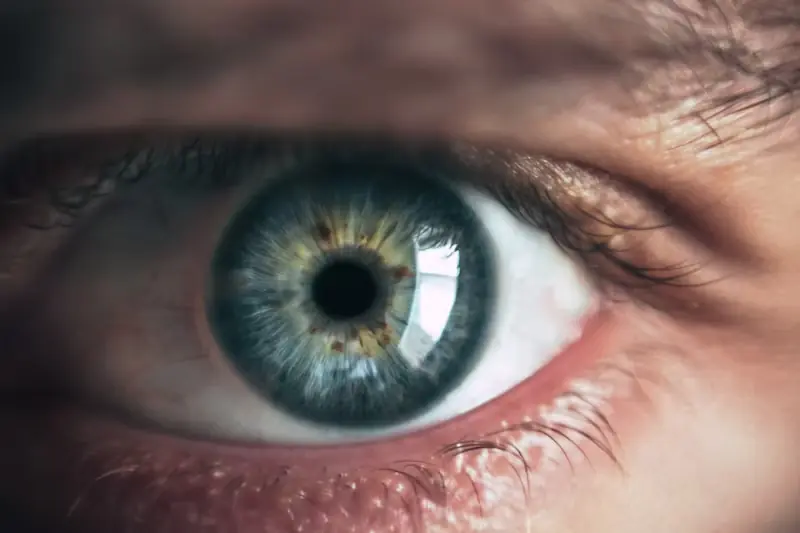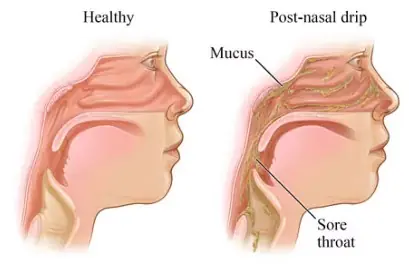
What Are Eye Floaters? Understanding Their Causes, Symptoms, and When to Seek Help
What Are Eye Floaters? Understanding Their Causes, Symptoms, and When to Seek Help
Eye floaters are a common yet often misunderstood visual phenomenon. They can appear as squiggly lines, specks, or cobweb-like shapes drifting across your field of vision, and for many, they are a cause of concern. If you've ever noticed these shapes, especially when looking at a bright background like a clear sky or a white wall, you may wonder what they are, what causes them, and if they pose any risks to your vision. Here’s what eye doctors want you to know about handling floaters.

Credit: Adobe Stock
What Are Eye Floaters?
Eye floaters are small, seemingly floating shapes that appear in your line of sight. These shapes might look like spots, threads, or squiggly lines, and they seem to move as you shift your gaze. Floaters are most noticeable when you're looking at a bright background, such as a blue sky, a blank white wall, or a computer screen. While they may seem concerning, eye floaters are usually harmless and often go unnoticed once you become accustomed to them.
Floaters tend to move with your eyes and can appear to dart away when you try to focus on them directly, which is one reason why they can be so frustrating. However, they don’t affect your vision permanently and often become less noticeable with time.
What Causes Eye Floaters?
The primary cause of eye floaters is age-related changes in the vitreous, a gel-like substance that fills the center of the eye. As we age, the vitreous becomes more liquid, and the microscopic fibers inside it begin to clump together. These clumps cast tiny shadows on the retina, which we perceive as floaters.

Credit: Unsplash
In addition to age, certain medical conditions and eye issues can contribute to the development of floaters. These include:
-
Eye infections
-
Uveitis (inflammation within the eye)
-
Retinal tears or detachment
-
Diabetic retinopathy, which can occur in individuals with diabetes
-
Nearsightedness (myopia)
-
Previous cataract surgery
While floaters are typically benign, they can sometimes be a symptom of more serious underlying conditions, especially when combined with other symptoms.
Who Is Most at Risk for Eye Floaters?
Some individuals are at a higher risk for developing floaters, particularly those who:
-
Are aging (as floaters become more common with age)
-
Are nearsighted
-
Have had cataract surgery
-
Have diabetes, which can lead to diabetic retinopathy
If you fall into one of these categories, you may be more likely to notice floaters in your vision.
Symptoms to Watch For
While most floaters are harmless, there are certain symptoms that warrant immediate medical attention. If you notice any of the following, it could be a sign of a more serious condition, such as retinal detachment or a tear:
-
A sudden increase in floaters
-
Flashes of light in your vision
-
A dark curtain or shadow moving across your field of vision
These symptoms can be indicative of retinal detachment, a medical emergency that requires immediate attention to prevent permanent vision loss.
How Are Eye Floaters Diagnosed?
To diagnose the cause of your floaters, an eye doctor will perform a dilated eye exam. This involves using eye drops to widen the pupils, allowing the doctor to have a clearer view of the vitreous and retina. The exam helps the eye specialist determine whether the floaters are benign or if they are caused by an underlying issue, such as a retinal tear or detachment.
When Are Floaters a Medical Emergency?
Most floaters are harmless, but certain signs could indicate a serious eye condition. If you experience any of the following, seek medical help immediately:
-
Sudden increase in the number of floaters
-
Flashes of light or "lightning streaks" in your vision
-
A dark shadow or curtain appearing in your peripheral vision
These could be signs of retinal detachment, a serious condition that can lead to vision loss if not treated promptly.
Treatment Options for Eye Floaters
In many cases, floaters don't require treatment. They often become less noticeable over time, and most people can learn to ignore them. However, if floaters significantly impair your vision or cause discomfort, there are treatment options available:
-
Vitrectomy: A surgical procedure that involves removing the vitreous gel and replacing it with a saline solution. While effective, vitrectomy is typically reserved for severe cases due to its risks, including infection and retinal damage.
-
Laser Therapy: This procedure uses a laser to break up floaters, making them less visible. Like vitrectomy, laser therapy is generally considered for severe cases, as it carries some risks, including potential damage to the retina.
Both treatments come with their own set of risks and complications, so they are typically only recommended when floaters are causing significant visual impairment or distress.
Lifestyle Tips for Managing Eye Floaters
For many people, floaters are simply a nuisance and not a serious medical concern. If you find that floaters are bothersome but not affecting your quality of life, here are a few lifestyle tips to help manage them:
-
Eye Exercises: Moving your eyes up and down or side to side can sometimes help shift the floaters out of your direct line of sight.
-
Diet and Supplements: A diet rich in omega-3 fatty acids, vitamin A, and zinc can support overall eye health and may help reduce the frequency or severity of floaters.
-
Avoid Smoking: Smoking can exacerbate eye problems and contribute to poor overall eye health. If you smoke, quitting can benefit your eye health in the long term.
Preventative Measures and Long-Term Outlook
While age-related floaters are often inevitable, there are steps you can take to minimize your risk and protect your eye health. Regular eye exams are essential, particularly if you're at higher risk due to factors like aging, diabetes, or nearsightedness. Dr. Rick Ansorge, an ophthalmologist, stresses the importance of paying attention to any sudden changes in your vision: “If you experience any sudden changes, seek medical advice immediately.”
Although most floaters are harmless, maintaining regular eye check-ups and being vigilant about changes in your vision can help catch any underlying issues early. If you notice a sudden increase in floaters or other symptoms like flashes of light or peripheral vision loss, it’s crucial to seek medical attention right away.
Conclusion
Eye floaters are a common visual phenomenon that most people will experience at some point in their lives. While they are typically harmless, it's essential to be aware of the symptoms that could indicate a more serious condition, such as retinal detachment. By understanding the causes, symptoms, and treatment options for eye floaters, you can ensure that you manage this condition effectively and protect your vision. Regular eye exams, a healthy lifestyle, and prompt attention to changes in your vision are your best defense in maintaining optimal eye health.
News in the same category


Is This the Lost Ark? Ground-Penetrating Radar Uncovers Intriguing Structures Beneath Turkish Site Tied to Biblical Legend

Hundreds of C@ncer-Causing Chemicals Found in Food Packaging: A Hidden Health Threat

Excessive Sleep Could Increase Dementia Risk: What You Need to Know

Bill Gates predicts three careers that AI won't replace

The Four Foods You Should Never Keep in Your Home: A Guide to Healthier Living

Kathryn Bernardo finally speaks up about rumors that she's now in a relationship

Experts Issue Warning About Frequent Use of Air Fryers: Here's What You Need to Know

Why Showering at Night Is Better Than in the Morning
For those struggling with poor sleep quality, muscle tension, or skin issues, showering at night may be a simple yet effective solution to improve overall health and well-being.

8 Anti-Can cer Foods to Add to Your Diet for Prevention

Understanding Mucus: What It Is, What It Means, and How to get rid of it

Understanding Dreams About De ceased Loved Ones: What They Mean and How They Help in Grieving

What Does It Mean To Wear a Ring On The Right Hand
The right hand represents strength, action, and decisiveness, while the finger and material you choose can further express your personality, values, and aspirations.

Over 200 People Are Killed By The “World’s Deadliest Food” Every Year, But Almost 500 Million People Still Eat It
No doubt there are many foods in the world that would make you feel full very quickly, but you do not usually find those at the dinner table every night.

Square Waves Are Real — and You Should Be Cautious When You See Them

Important Signs You Might Have Polymyalgia Rheumatica: A Comprehensive Guide

Off The Record: Scientists Warn of Unprecedented Global Warming Threats By 2200, Leading to Catastrophic Heatwaves, Famine, and Flooding
Scientists at Germany’s Potsdam Institute for Climate Impact Research predict a shocking rise in global temperatures by 2200, with devastating impacts including severe heatwaves, famine, and flooding. Even if carbon emissions are reduced, the future loo

How Your Feet Could Be Signaling Heart Problems and Clogged Arteries
Symptoms like pain, swelling, numbness, or changes in skin color can indicate underlying issues with circulation, including peripheral artery disease or even heart disease.

Man Over 700 Eggs In One Month To See What It Would Do To His Body. Here’s What Happened.
Dr. Nick Norwitz’s experiment of eating 720 eggs in 30 days provides an eye-opening perspective on the relationship between dietary cholesterol and heart health.
News Post

What Lies Beneath: Camera Dropped 305 Feet into Antarctic Ice Reveals Breathtaking Secrets of Earth’s Oldest Climate Record

Is This the Lost Ark? Ground-Penetrating Radar Uncovers Intriguing Structures Beneath Turkish Site Tied to Biblical Legend

No Paycheck, No Problem: What Pope Leo XIV Will Receive as the New Leader of the Catholic Church

Robert De Niro Slams Trump at Cannes: “This Is Not Just America’s Problem”

Hundreds of C@ncer-Causing Chemicals Found in Food Packaging: A Hidden Health Threat

Joe Biden diagnosed with aggressive prostate c@ncer; political leaders express support

Ivana Alawi Re-Blesses Her Entire Home Following Alleged Haunted Encounter
After experiencing unsettling events during an out-of-town trip, Ivana Alawi decided to have her whole house blessed again, sharing the spooky story in her latest vlog with Kyline Alcantara.

Donald Trump sl@mmed after sharing yet another baffling post about Taylor Swift

Ultimate Guide to Bridal Ubtan Recipes for Glowing, Radiant Skin: Timeless Beauty Secrets You Must Try
By consistently using these bridal ubtan recipes in the weeks leading up to your big day or any special occasion, you can unveil a luminous complexion that truly shines.

Excessive Sleep Could Increase Dementia Risk: What You Need to Know

Brooklyn Half Marathon Runner Passes Away During Race After Collapsing on the Course

I Saw Her Name Glowing on His Phone Screen And My World Shattered
A glowing phone screen in a dark room revealed a deva$tating secret—my husband’s betrayal with someone I never expected. What followed was heartbre@k, rage, and the pa!nful choice to walk away.

DIY Coffee Face Packs for Glowing Skin – Coffee Benefits for skin
These natural masks nourish, rejuvenate, and protect your skin while addressing concerns like wrinkles, dark spots, dryness, and dullness.

Solenn Heussaff Shows Off her Bl@ck Eye
Celebrating Mother’s Day with a touch of humor and a minor injury, Solenn Heussaff reveals how her youngest daughter accidentally gave her a black eye during a sleepy moment.

My Sister’s Face Staring Back at Me from His Laptop Screen: The Secret That Shattered My World
A forgotten laptop revealed a secret I never expected—my husband’s hidden life with my sister, a web of l!es, pa!n, and betrayal that turned my world upside down. This is the raw, heart-wrenching story of trust br0ken and truth uncovered.

Katy Perry Opens Up About a Hum!liating Setback That Almost Ended Her Music Career

Alynna Opens Up About Family Rift with Hajji Alejandro’s Relatives and Responds to Accusations of Gold-Digging
In an emotional reveal, singer Alynna discusses the tension with some members of Hajji Alejandro’s family, affirming her genuine love and sacrifice during their 27-year relationship.

My Sister Left Her Phone in My Car, What I Saw in Those Texts Shattered Everything
I never expected a forgotten phone to reveal a brutal conspiracy between my sister and someone I trusted — plotting to ste@l the family home and betray me. What followed was heartbre@k, rage, and the f!ght for justice.

Paolo Bediones Breaks Silence on Viral Privat3 V!de0 Controversy After 11 Years
After more than a decade, TV host Paolo Bediones opens up about the ordeal surrounding the leak of his privat3 vide0s and the threats he faced.

Kristel Fulgar Shares How Her Husband’s Conversion to INC Proved He Was ‘The One’
Kristel Fulgar opens up about her husband Ha Su-hyuk’s heartfelt journey to convert to Iglesia ni Cristo, revealing how this commitment confirmed their destined love.